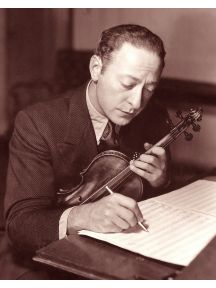Jascha Heifetz
Items 1 -10 of 81
-
 Alt-Wien
Alt-WienStandard Binding (B2257): $11.99 Digital (B2257D): $8.39 Download (B2257D-PDF): $11.99 Violin, Piano -
 Ao Pe Da Fogueira
Ao Pe Da FogueiraStandard Binding (B2673): $11.99 Digital (B2673D): $8.39 Download (B2673D-PDF): $11.99 Viola, Piano -
 Ao Pe Da Fogueira
Ao Pe Da FogueiraStandard Binding (B2609): $9.99 Digital (B2609D): $6.99 Download (B2609D-PDF): $9.99 Violin, Piano -
 Ave Maria
Ave MariaStandard Binding (B2433): $10.99 Digital (B2433D): $7.69 Download (B2433D-PDF): $10.99 Violin, Piano -
 Barcarolle
BarcarolleStandard Binding (B3378): $11.99 Digital (B3378D): $8.39 Download (B3378D-PDF): $11.99 Violin, Piano
 A legend in his own lifetime, Jascha Heifetz is still regarded as perhaps the single most important influence on violin playing since Niccolò Paganini. Eminent violinists such as Leonid Kogan, Yehudi Menuhin, Nathan Milstein, David Oistrakh, ltzhak Perlman, lsaac Stern, Henryk Szeryng, and Pinchas Zukerman acknowledged Heifetz's supremacy on the instrument, and Fritz Kreisler once remarked that Heifetz’s technique "begins where I leave off."
A legend in his own lifetime, Jascha Heifetz is still regarded as perhaps the single most important influence on violin playing since Niccolò Paganini. Eminent violinists such as Leonid Kogan, Yehudi Menuhin, Nathan Milstein, David Oistrakh, ltzhak Perlman, lsaac Stern, Henryk Szeryng, and Pinchas Zukerman acknowledged Heifetz's supremacy on the instrument, and Fritz Kreisler once remarked that Heifetz’s technique "begins where I leave off."
Born in Vilna, Lithuania, on February 2nd, 1901, Heifetz began playing the violin at the age of three. After graduating from Vilna’s Royal School of Music the eight-year-old violinist went to St. Petersburg where he became Leopold Auer’s star pupil. As a violin prodigy, Heifetz established an immense reputation throughout Europe, and, at the age of eleven, performed the Tchaikovsky Concerto with the Berlin Philharmonic under Artur Nikisch. Shortly before the Russian Revolution, Heifetz and his family emigrated via Siberia and Japan to the United States. Following their arrival in San Francisco, the family traveled across the continent to Boston where they stayed with relatives. Shortly afterwards, on October 27th, 1917, Heifetz made his triumphant Carnegie Hall debut which instantly established him as a new musical idol in America. Over the next 40 years, he toured throughout the United States, Europe, the Middle East, Asia, and Australia, and eventually accepted a post at the University of Southern California, Los Angeles, in 1962, where the Heifetz Chair in Music was established in 1975.
In terms of technical brilliance, Heifetz stood in a class by himself. His tonal palette was vast, and the focused intensity of his vibrato highlighted the purity of his intonation. He was able to create a wide range of expressive nuances in his playing, and his use of portamento was unparalleled in its ease of execution. Heifetz’s unfailing technical security enabled him to play with a devilish abandon, and this combination of burning intensity with angelic perfection was undoubtedly the most striking aspect of his playing.
Heifetz’s immense repertoire was a natural consequence of his ability to learn at an astonishing rate. In addition to the standard works, he commissioned and championed many important 20th century compositions, including concertos by William Walton, Sergei Prokofiev (No. 2) and Erich Wolfgang Korngold. Heifetz was also passionately fond of chamber music and performed much of this repertoire in his later years, in addition to becoming an accomplished pianist.
Heifetz passed away in Los Angeles on December 10, 1987, leaving behind one of the greatest musical legacies of the 20th century. His unparalleled achievement still serves as an inspiration for players today.
